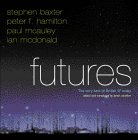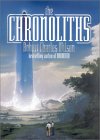 |
E-mail Locus
Subscribe to Locus Magazine
|
 |
 |
SFFH Reviews and Articles in General Publications
Monday 25 June 2001

Summer Reading
 § Salon June 22, 2001
§ Salon June 22, 2001
Laura Miller reviews Neil Gaiman's American Gods, a Salon pick for the best of June fiction.
"American Gods" is a crackerjack suspense yarn with an ending that both surprises and makes perfect sense, as well as many passages of heady, imagistic writing. And for all that he's missed in the American propensity for religious fanaticism, Gaiman has exactly nailed the way we talk...
Whatever its loftier intentions, "American Gods" is a juicily original melding of archaic myth with the slangy, gritty, melancholy voice of one of America's great cultural inventions -- the hard-boiled detective; call it Wagnerian noir. The melting pot has produced stranger cocktails, but few that are as tasty.
 A shorter item by Laura Miller (Monday June 25) recommends David Colbert's The Magical Worlds of Harry Potter (Lumina Press): "I suspect the most avid audience for this book will be curious kids who will be delighted to learn that centaurs, manticores, phoenixes and fiery salamanders have been around (at least in the human imagination) for centuries and can be found in many other books."
A shorter item by Laura Miller (Monday June 25) recommends David Colbert's The Magical Worlds of Harry Potter (Lumina Press): "I suspect the most avid audience for this book will be curious kids who will be delighted to learn that centaurs, manticores, phoenixes and fiery salamanders have been around (at least in the human imagination) for centuries and can be found in many other books."
§ Washington Post Book World June 24, 2001
Here's Michael Dirda on Neil Gaiman's American Gods.
Not everyone cares for fantasy, and some people can't read the genre at all, unless it's labeled magic realism. But if you have enjoyed, say, John Crowley's Little, Big or Stephen King's The Stand or the urbane horror fiction of Jonathan Carroll, not to mention Gaiman's own Sandman or Frank Miller's Ronin, then American Gods arrives just in time for your July or August vacation. There are flaws in the book -- Shadow's big moment feels anti-climactic, the gods of the media could use more definition, and the novel is probably too long -- but on the whole the story accelerates crisply toward its surprise ending. So watch out this summer: Big storm coming.
 § The Globe and Mail June 9, 2001
§ The Globe and Mail June 9, 2001
The Canadian paper's Summer Reading feature includes J.G. Ballard's Super-Cannes (Flamingo) [US edition due in October], reviewed by H.J. Kirchhoff.
Ballard's always been a fine writer, even early on, when his luridly lyrical allegories were confined to the science-fiction ghetto...
Reviews
 § Washington Post Book World June 24, 2001
§ Washington Post Book World June 24, 2001
Elsewhere in this week's Book World is a science fiction column by Paul Di Filippo, covering Jeffrey Ford's The Beyond (Eos), Ursula K. Le Guin's Tales of Earthsea (Harcourt), Cecilia Dart-Thornton's The Ill-Made Mute (Warner), and China Miéville's Perdido Street Station (Del Rey). On Ford:
There's not a false note in this novel, as Ford juggles his symbols and patternings -- a tattered veil, a poison bird, a book without pages -- with the grace of a master. His characters strike sparks from the reader's heart, and not even so lowly a figure as Cley's loyal dog Wood fails to resonate both humorously and tragically. Packed with surreal wonders, this novel is fully the equal of Jonathan Lethem's Girl in Landscape (1998), with which it shares a philosophy and angle of attack. Ford has brought back a gem from the Beyond.
 And — Martin Gardner reviews Ian Stewart's mathematical fantasy Flatterland: Like Flatland, Only More So (Perseus): "a work about mathematics cleverly disguised as a fantasy sequel to Edwin Abbott's classic Flatland".
And — Martin Gardner reviews Ian Stewart's mathematical fantasy Flatterland: Like Flatland, Only More So (Perseus): "a work about mathematics cleverly disguised as a fantasy sequel to Edwin Abbott's classic Flatland".
§ Salon June 18, 2001
Back at Salon, Gavin McNett contributes a fantasy-review of Flatterland along with Abbott's original book and related books by Clifford A. Pickover and Michio Kaku.
§ Slate June 18, 2001
Lauren Winter reacts (When you take God out of Narnia, is there anything left?) to the news that HarperCollins plans to promote C.S. Lewis's Narnia series while downplaying the Christian themes therein.
Despite the series' heavily religious coding, it's far from clear that most children decipher or even notice it. I didn't when I read them in grammar school, and neither did the Jewish and Hindu friends I polled. We just thought we were reading a riveting tale, one in which, as in so much children's literature, good triumphs over evil and a hero brings on a utopian reign of peace. Like all successful religious allegories, Narnia can be read on many levels...
And there are some interesting reader reactions; scroll to the bottom.
 § January June 2001
§ January June 2001
Claude Lalumière reviews Peter Crowther's anthology Futures, a collection of four novellas by Stephen Baxter, Peter F. Hamilton, Paul McAuley, and Ian McDonald (published individually by small-press PS Publishing last year). Lalumière is baffled by the general admiration of McAuley's writing, but he likes Ian McDonald's "Tendeléo's Story":
McDonald recontextualizes 1960s Ballardian disaster novels (The Drowned Word, The Crystal World, etc.) within postcolonial discourse and evokes Wells' The War of the Worlds as if rewritten by Neal Stephenson and Octavia Butler. "Tendeléo's Story" is set within the author's Chaga series, in which Earth is slowly being transformed at the molecular level by an invading lifeform or substance. ... It's a gorgeous and harrowing work, a magnificent capstone for this anthology.
 • Publishers Weekly June 18, 2001 [not online]
• Publishers Weekly June 18, 2001 [not online]
Starred reviews for Robert Charles Wilson's The Chronoliths (Tor, due August 20):
This superb novel, combining Wilson's trademark well-developed characters and fine prose with stunning high-tech physics, should strongly appeal to connoisseurs of quality science fiction.
And for Peter David's non-tie-in novel Sir Apropos of Nothing (Pocket, due July 10):
An antihero for the 21st century, Apropos springs from his mother's womb with a full set of teeth, ready to bite anyone who gets in the way of his survival in this fast, fun, heroic fantasy satire...
There's also a sidebar interview with Peter David (page 65).
 • Entertainment Weekly June 29/July 6, 2001 [not online]
• Entertainment Weekly June 29/July 6, 2001 [not online]
The magazine's "It List" of the 100 Most Creative People in Entertainment includes Daniel Handler ("Lemony Snicket") as "It Children's Best Nightmare", Jonathan Lethem as "It Voice of Brooklyn", Frank Miller as "It Comic Book Project", and George Saunders as "It Short Story Master" (all pages 90-95).
Monday 18 June 2001

Summer Reading
 • NPR June 12, 2001
• NPR June 12, 2001
Book critic Alan Cheuse of NPR's "All Things Considered" named to his list of books for summer reading (according to PW Daily) Jonathan Carroll's The Wooden Sea (Tor), as well as Joyce Carol Oates's collection Faithless (HarperCollins), Louise Erdrich's The Last Report on the Miracles at Little No Horse (HarperCollins), and Michael Pollan's nonfiction Botany of Desire: A Plant's-Eye View (Random House).
§ Another NPR Summer Reading list with recommendations from various critics includes, from David Kippen (for young adults) "anything by Jules Verne"; from Laura Miller, Connie Willis's Passage and (for young adults) Tolkien's The Lord of the Rings; and from Elizabeth Taylor, (for young adults), Louis Sachar's Holes.
Reviews
 § New York Times Book Review June 17, 2001
§ New York Times Book Review June 17, 2001
Gerald Jonas's SF column covers Ursula K. Le Guin's Tales from Earthsea (Harcourt); Paul Levinson's Borrowed Tides (Tor); and Maxine McArthur's Time Future (Warner Aspect). Jonas admires Le Guin greatly, and has reservations about Levinson and McArthur.
In a brief but equally useful foreword, Le Guin acknowledges her debt to J. R. R. Tolkien's ''Lord of the Rings'' trilogy, the touchstone for all modern world-building in the fantasy mode. Even more important, she decries the ubiquity of what she calls ''commodified fantasy'' -- work that imitates the manner of the great fantasists but that ''takes no risks: it invents nothing. . . . It proceeds by depriving the old stories of their intellectual and ethical complexity, turning their action to violence, their actors to dolls and their truth-telling to sentimental platitude.''
 Also, Gregory Maguire reviews Eoin Colfer's Artemis Fowl (Hyperion), with mixed response...
Also, Gregory Maguire reviews Eoin Colfer's Artemis Fowl (Hyperion), with mixed response...
How well has the author done at fulfilling his aims? ... Colfer has done enormously, explosively well. ... [yet]
In a nervy and unnerving marriage of style and substance, Colfer adopts the rhythms of macho banter from television police dramas, Hollywood espionage thrillers and B-grade buddy war films. ... It's a shame to report it, but ''Artemis Fowl'' has been rinsed clean of anything approaching genuine magic.
Interviews
§ BookSense.com June 2001
Gavin J. Grant interviews Terry Pratchett.
After Harry Potter, do you think general readers will be willing to give
more good fantasy a chance?
Well, Harry Potter sure hasn't done my sales any harm. that's
for sure. I think Harry Potter means more publishers will publish
fantasy (at least, for children) but, on the whole, the answer
is no. Arguably, the success of Harry Potter will mean that
fantasy is seen as appropriate *only* for children, and that
adult readers are somehow dopey. Certainly you'll find that
state of mind is prevalent in the UK media.
 § Amazon UK
§ Amazon UK
Interviews posted recently (undated):
Amazon.co.uk: What are the common mistakes made by most wannabe SF and fantasy authors?
Jarrold: If they want to be published, as opposed to write for pleasure, they should study what is selling, how it stacks up with what they want to write, and see if they feel there is a way of doing both. I don't mean that they should compromise. If you look at Ken Macleod, China Mieville and Jon Courtenay Grimwood, you have three very different authors who follow their own muses. But they also fulfill the basic tenets of writing about interesting people, some of who we empathise with, and being bloody good storytellers. Many unpublished authors fell "my way, right or wrong". Very, very few are right in terms of publishers needs.
Amazon.co.uk: What do you immediately look for in a potential book?
Jarrold: I want the first ten pages to hook me.
Monday 11 June 2001

 § The New Yorker June 11, 2001
§ The New Yorker June 11, 2001
This issue's Briefly Noted page [content at this link will change shortly] has a short review of The Song of the Earth by Hugh Nissenson (Algonquin), about a genetically-engineered artist born in 2037:
This fictional portrait of the artist as a young man is distinguished by the intensely imagined world that surrounds him—a world in which transgendered religious gurus preach over the Web, the rich live in hanging-garden apartments high above the canals of a half-submerged Manhattan, and a terrorist women's movement battles a resurgence of polygamy.
The Amazon page also has PW's review, and reader reviews.
 • Publishers Weekly [not online]
• Publishers Weekly [not online]
Recent starred reviews for [May 14 issue] Jacqueline Carey's Kushiel's Dart (Tor) -- "brilliant and daring debut ... an assured and magnificent book that will appeal to both male and female readers"; for [June 4 issue] Joe R. Lansdale's Zeppelins West (Subterranean); and, among PW's e-publishing reviews, for Linda Nagata's Nebula-winning novella "Goddesses" (Sci Fiction). The complete Carey and Landis PW reviews are reprinted on the respective Amazon pages.
 § January June 2001
§ January June 2001
Claude Lalumière reviews Eugene Byrne's Things Unborn (UK: Simon & Schuster/Earthlight):
If one were to try to classify Things Unborn, one would be forced to say something like, "It's a speculative linguistic alternate history religious political police procedural science fiction thriller pastiche." That's quite a mouthful. I prefer to say, somewhat more simply, that it's a fun and intelligent novel.
Wednesday 6 June 2001

 • Publishers Weekly May 28, 2001 [not online]
• Publishers Weekly May 28, 2001 [not online]
A starred review for the 1st US edition of Iain M. Banks's Look to Windward (Pocket), to be published August 14; and a blue-box review [indicating a book of special interest, though not a starred review] for Neil Gaiman's American Gods (Morrow, June 19) with this forecast:
Even when he isn't in top form, Gaiman, creator of the acclaimed Sandman comic series, trumps many storytellers. Momentously titled, and allotted a dramatic one-day laydown with a 12-city author tour, his latest will appeal to fans and attract mainstream review coverage -- for better or for worse -- because of the rich possibilities of its premise.
§ USA Today May 31, 2001
Speaking of Neil Gaiman, the US national newspaper has a short article about Scifi.com's audio play production of Neil Gaiman's "Snow Glass Apples". The piece also mentions Gaiman's favorite fan site: Holycow.com/dreaming.
§ BookSense.com June 5, 2001
Another online interview with Connie Willis, this one fairly long, conducted by BookSense staffer Gavin J. Grant, about what she'd do if she weren't a writer, who she'd like to collaborate with, and her interest in the JonBenet Ramsey case.
Tuesday 5 June 2001

 § Salon June 4, 2001
§ Salon June 4, 2001
Andrew O'Hehir celebrates J.R.R. Tolkien's The Lord of the Rings as "the book of the century", despite intellectual dismissal, in a very long article published in two parts, along the way reviewing T.A. Shippey's recent book on Tolkien.
Hugely ambitious in scope yet seemingly antique in sensibility, "The Lord of the Rings" occupies an anomalous and uncomfortable position in 20th century literature. Considered on its own terms, Tolkien's epic -- he never intended it as a trilogy, although it was first published and absorbed into public consciousness in three volumes -- poses a stern challenge to the very concept of modernity, and perhaps especially to modern literature and its defenders.
 § Slate May 30, 2001
§ Slate May 30, 2001
Polly Shulman tells how "fantasy writers wage a noble battle against the forces of schlock" -- that is, what Ursula K. Le Guin and Diana Wynne Jones have to offer in place of the populist J.K. Rowling. Shulman characterizes Le Guin's comments in the introduction to Tales from Earthsea as "snooty", but acknowledges
If anyone has a right to be so snooty, it's Le Guin. She really does deliver those universal truths she goes on about, beginning in A Wizard of Earthsea. ... [yet] Every genre has its hacks, and people have always had a taste for sentiment; why should Le Guin, who's clearly the real thing, feel threatened?
And Jones's Dark Lord of Derkholm is
a wonder of affectionate literary criticism. Even as she parodies the dungeons-and-dragons formula, Jones cleaves to it. ... Like Le Guin's villains in reverse, Jones restores the old stories to their rightful intellectual and ethical complexity, turning their violence to action, their dolls to actors, and their sentimental platitudes to truth-telling.
 § New York Times Book Review June 3, 2001
§ New York Times Book Review June 3, 2001
The Book Review's mid-term Summer Reading issue, listing books reviewed since last December's Holiday Books issue (and decorated with futuristic Chris Ware illustrations), includes the following SF selections from Gerald Jonas's SF column (with links to the original reviews preserved here):
Also listed in the general fiction lists: Joyce Carol Oates's Faithless, Louise Erdrich's The Last Report on the Miracles at Little No Horse, Andrew Crumey's Mr. Mee, and Jonathan Carroll's The Wooden Sea.
§ San Francisco Chronicle June 3, 2001
Michael Berry's SF column reviews Tim Powers's Declare, Terry Bisson's The Pickup Artist, and Jonathan Carroll's The Wooden Sea.
 § Entertainment Weekly June 8, 2001
§ Entertainment Weekly June 8, 2001
The issue with Britney and Christina on the cover has a 1-page article celebrating the return to print of Samuel R. Delany.
May Field Inspections
|








 • Entertainment Weekly June 29/July 6, 2001 [not online]
• Entertainment Weekly June 29/July 6, 2001 [not online]



 § The New Yorker June 11, 2001
§ The New Yorker June 11, 2001 • Publishers Weekly [not online]
• Publishers Weekly [not online] § January June 2001
§ January June 2001 § Salon June 4, 2001
§ Salon June 4, 2001 § Slate May 30, 2001
§ Slate May 30, 2001 § New York Times Book Review June 3, 2001
§ New York Times Book Review June 3, 2001 § Entertainment Weekly June 8, 2001
§ Entertainment Weekly June 8, 2001